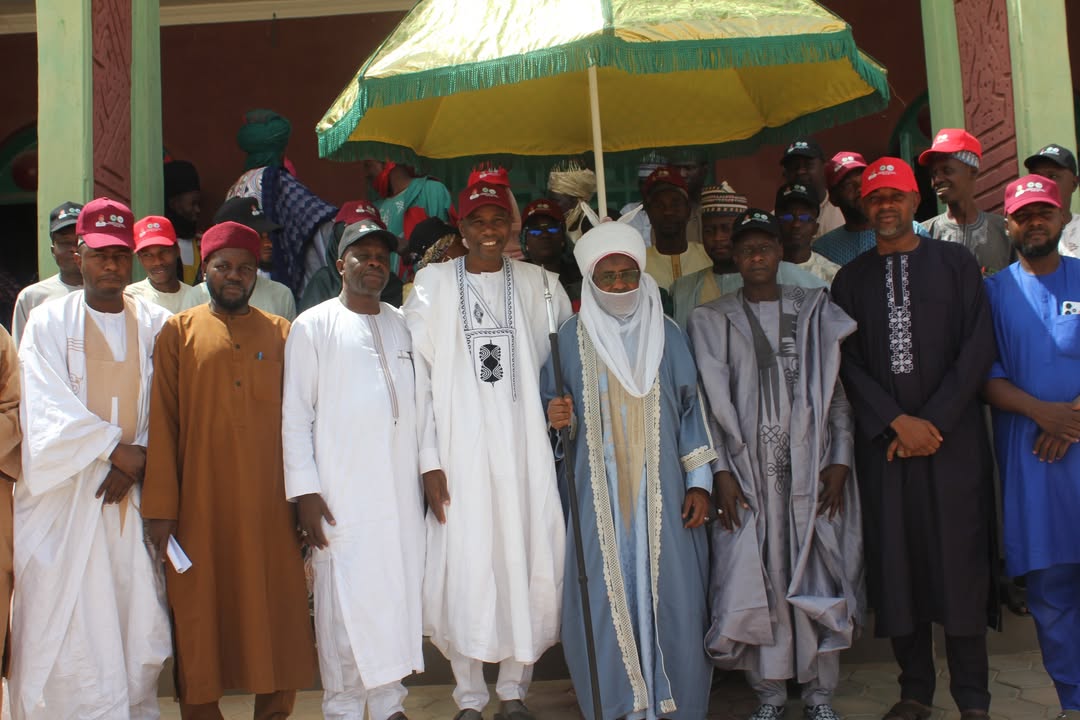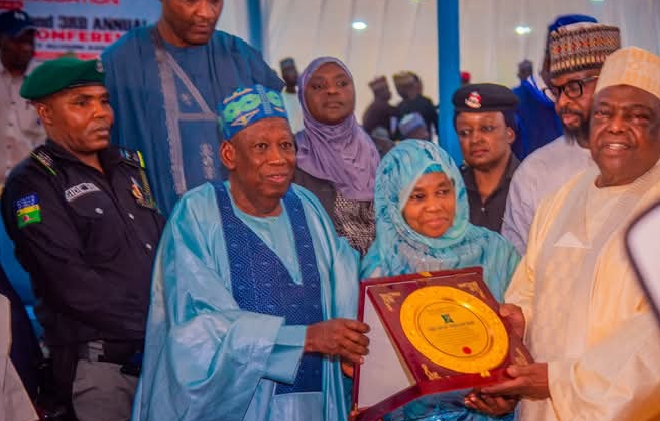News
NCC, stakeholders chart new path to effective telecoms regulation, industry growth

Nasiru Yusuf
The Nigerian Communications Commission (NCC) has hosted the second edition of the Nigerian Telecoms Leadership Summit, in line with its tradition and commitment to engage with stakeholders in the telecom ecosystem with a view to pursuing proactive regulatory interventions targeted at ensuring an enabling operating environment and improving investment climate in the Nigerian telecom industry.
KANO FOCUS reports that the event, which took place at the Eko Hotels, Victoria Island, Lagos, was an assemblage of key industry stakeholders with the central objective to analyse the current state of the sector, process the issues, and chart new pathways to a more effective and sustainable regulatory regime for the stability and growth of the Nigerian telecom industry.
Speaking at the event, the Executive Vice Chairman and Chief Executive Officer of the NCC, Prof. Umar Danbatta, said that the theme of the Summit: “The Future of Telecom Regulation in Nigeria,” presented a unique opportunity for the Commission to interact with critical stakeholders.
Through such interaction, the EVC said the Commission would be able to brainstorm and migrate to new frontiers of visionary regulations that will galvanise and foster desired growth in the industry.

Danbatta explained that the outbreak of the COVID-19 pandemic triggered political and socio-economic uncertainties globally and underscored the crucial role of digital connectivity in keeping societies functioning, as the online life became, essentially, new way of life.
He stated that with the increased dependence on digital platforms, the theme of the event had become necessary in order to put in place a broader regulatory framework that will enhance and protect the integrity of the industry in the emergent digital economy.
In this context, the EVC said the NCC will continue to diligently pursue the implementation of policy frameworks such as Nigeria National Broadband Plan (NNBP) 2020-2025; and the National Digital Economy Policy and Strategy (NDEPS) 2020-2030 which are consistent with NCC’s regulatory interventions such as the Commission’s Strategic Management Plan (SMP), 2020-2024 and Strategic Vision Plan (SVP), 2021-2025, among others.
Danbatta said all the policy and regulatory frameworks principally seek to provide a platform for Nigerian citizens to engage in innovative developments for the telecoms industry and improve the nation’s ability to compete in the ever-competitive global space.
Explaining further on the transformation happening as a result of the expanding spectrum of digital ecosystem, Danbatta said the industry is witnessing new business delivery and breakthroughs due to the expansion of boundaries of digital Small and Medium Enterprises (SMEs), especially fintech and e-commerce firms.
The EVC said those consequential ecosystem have contributed to the growth of the Nigerian digital economy riding on telecom infrastructure.
Danbatta aptly reckoned that digital services and contents provided by these SMEs will leverage on broadband infrastructure and the upcoming deployment of Fifth Generation (5G) network being driven by the Commission to deliver more innovative and high-quality experiences to consumers.
“The Commission’s successful auction and licensing of the 3.5GHz spectrum licences in the last quarter of 2021 for the deployment of 5G technology is set to creat many opportunities for the development of the industry and as a regulator, we are conversant with the fact that a dynamic regulatory environment is needed to sustain this industry growth”, Danbatta said.
“Therefore, it has become imperative for us, as critical stakeholders, to appraise the progress made so far as an industry and chart the course for the future of the telecoms industry in the country,” he stated.
The EVC also informed that one of the sectors that had been positively impacted by the digital transformation is the financial services sector.
Amplifiying the EVC’s position, in his keynote address titled: “The Future of Telecom Regulation in Nigeria: Challenges of Access to Funding”, the
Chief Executive Officer of Stanbic IBTC, Dr. Ademola Sogunle, asserted that the telecommunications industry had become the sustaining stimulus of the post-pandemic era as consumers’ behaviours continue to shift towards digital trends.
Danbatta said that the contribution of the telecom sector continues to benefit the entire ecosystem.
While reviewing resolutions of the first edition of the Summit held in 2019, the Director, Policy, Competition and Economic Analysis, NCC, Yetunde Akinloye, said the Commission had implemented the recommendations of that meeting among which were Executive Order on Duplicity of Taxes and Levies, and Harmonization of Right of Way (ROW) fees.
She said other recommendations implemented include addressing of interconnect debt, review of the framework on interconnect clearing houses to ensure 10 per cent of traffic is routed through clearing houses, incentive for small operators as well as monitoring compliance with Code of Corporate Governance.
To sustain the momentum from the previous industry leadership engagement, this year’s Summit provided the Chief Executives of companies in the telecom sector an opportunity to meet the EVC and top Management of the Commission at a roundtable for deeper thinking and greater reflection on the challenges in the sector and proffer meaningful solutions.

Headlines
Kano AGILE renovates 1,300 schools, enrolls 30,000 girls in three years

Aminu Abdullahi Ibrahim
The Kano State Ministry of Education’s Adolescent Girls Initiative for Learning and Empowerment (AGILE) Project, supported by the World Bank, has successfully renovated over 1,300 senior and junior secondary schools in the state in the last three years.
KANO FOCUS reports that the state commissioner for education, Alhaji Ali Haruna Makoda, disclosed this during a visit to the Karaye Emirate on Tuesday.

He added that the AGILE program has enrolled more than 30,000 girls through targeted outreach, grants, and its Second Chance education initiative.
Makoda further revealed that the state government has finalized plan to construct 130 new schools in rural communities, with over 35,000 girls already benefiting from financial assistance under the scheme.
He urged the Karaye Emirate to lend full support to the program and prioritize girls’ education.
In his remarks, the Emir of Karaye, Alhaji Muhammad Maharaz, pledged the emirate’s commitment to advancing girls’ education in Kano State.
He commended the state government and the commissioner for their dedication to the programme’s success.
“It is our collective responsibility to support this initiative,” the Emir stated, calling for measures to ensure beneficiaries complete their education with strong academic outcomes.
The commissioner’s delegation consist of the Kano State AGILE Project Coordinator, Malam Mujitapha Aminu and other members of State Programme Implementation Unit (SPIU).

Headlines
BUK Faculty of Education celebrates 50 years anniversary, launches Alumni Association

Aminu Abdullahi Ibrahim
Bayero University Kano (BUK) on Monday celebrated the 50th anniversary of its Faculty of Education and inaugurated its Alumni Association at the Convocation Arena of the university’s new campus.

KANO FOCUS reports that the event was graced by government officials, education stakeholders, and alumni all gathered to commemorate the faculty’s contributions to Nigeria’s educational sector.
In her keynote address, the State Minister for Education, Mrs. Suwaiba Sa’id Ahmad announced the Federal Government’s Sector Renewal Initiative designed to transition Nigeria from a resource-based to a knowledge-based economy.
She highlighted that the aim of the renewal initiative consists of – Reducing the number of out-of-school children; combating learning poverty; nhancing skills development and human capital for the labor market
The minister noted that the initiative prioritizes Technical and Vocational Education and Training (TVET); Science, Technology, Engineering, and Mathematics (STEM); Digital literacy and education quality assurance.
Mrs. Ahmad disclosed that the Federal Government had disbursed ₦35 billion to 261 beneficiaries under the Nigerian Education Loan Fund (NELFUND), with BUK among the top beneficiaries.
“So far, the scheme has received 420 applications, and we are scaling up investments,” she stated.
She further confirmed that President Bola Ahmed Tinubu approved ₦120 billion to boost TVET programs, with plans to train 650 youths in technical, vocational, and digital skills over the next two years.
Emeritus Professor Sani Ahmad Sufi, former Permanent Secretary of the Ministry of Education, praised the faculty for its high-quality graduates.
“Our pride lies not just in the number of graduates produced yearly, but in their impact across Nigeria and beyond,” he said.
He added that the faculty has produced Nigeria’s largest pool of graduate teachers many of whom hold key positions nationally and internationally.
The National Chairman of the All Progressives Congress (APC), Dr. Abdullahi Umar Ganduje applauded the faculty for its significant role in advancing education in Nigeria.
The event concluded with awards presented to distinguished alumni and supporters of the faculty in recognition of their contributions to its growth.

Headlines
Governor Yusuf Champions Education, Resolves Certificate Crisis for Kano Graduates

Kano State Governor Abba Kabir Yusuf has emerged as a beacon of hope for graduates left stranded due to the previous administration’s negligence regarding academic certificates.
His determination to rectify these injustices has culminated in decisive actions to secure the future of Kano’s youth. Ibrahim Adam, the Special Adviser to the Governor on Information, shared these developments with the media.
On December 9, 2024, Governor Yusuf traveled to Cyprus with a mission to obtain the overdue academic certificates for Kano students affected by the prior administration’s failure to meet its educational financial obligations.
During a critical meeting with the management of Near East University, the governor focused on facilitating the release of certificates for students who graduated between 2015 and 2019, particularly in essential fields like Medicine and Nursing.
This was confirmed by Sunusi Bature Dawakin Tofa, the governor’s spokesperson.

In a significant move, Governor Yusuf has settled the outstanding fees of €1.4 million (approximately ₦2.5 billion) owed to the university for 84 medical and2015 to 2019.
This substantial financial commitment honors the dedication and hard work of these graduates, restoring their hopes for a future that had previously been unjustly delayed.
According to Ibrahim Adam, the certificates are set to be handed over to the Kano State Scholarship Board through the Nigerian Ambassador to Turkey, marking a pivotal moment for the affected students.
Governor Yusuf acknowledged the challenges faced by the graduates, declaring, “This situation has been a significant setback for our children, hindering their dreams and aspirations, and it has also affected our state, which is in dire need of their expertise.”
His vision for a prosperous Kano is centered on prioritizing education, ensuring that talented individuals can make valuable contributions to the state’s advancement.
The governor’s proactive measures not only address the systemic issues in the education sector but also inspire renewed hope among Kano’s youth.
By fulfilling his promises, he emphasizes the crucial role of supporting young people in achieving their aspirations, which is vital to the state’s growth.
As this milestone is celebrated, it is evident that Governor Abba Kabir Yusuf’s relentless pursuit of educational reform signals a transformative era for Kano State.
His administration’s unwavering focus on education stands as a vital investment in the futures of individuals and the overall development of the state.
Under his leadership, Kano State is poised to realize its full potential, with eager graduates ready to make impactful contributions to their communities.
Governor Yusuf’s commitment to empowering the youth serves as an enduring reminder that with dedication and decisive action, a brighter future is attainable for all.














